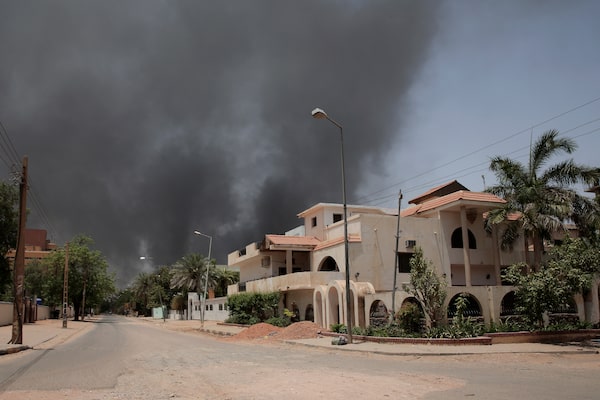
Smoke is seen rising from a neighborhood in Khartoum, Sudan, April 15, 2023.Marwan Ali/The Associated Press
Heavy fighting between military and paramilitary forces has erupted in the centre of Khartoum, inflicting civilian casualties across the Sudanese capital, shutting down its main airport and casting fresh doubt on the regime’s promises of a transition to civilian-run democracy.
Plumes of smoke billowed from fires in several of Khartoum’s buildings, fighter jets streaked through the sky, and at least two commercial passenger jets at the airport were set ablaze, while the noise of constant gunfire and heavier weapons could be heard across the city, according to videos posted on social media on Saturday by the city’s frightened residents.
Sudan’s conflict explained: What’s behind the latest fighting?
The fighting was reportedly spreading across the country, including the war-ravaged Darfur region. According to the Sudanese Doctors’ Union, 27 people were reportedly killed and more than 180 injured in the fighting across Sudan on Saturday.
The clashes between Sudan’s regular military and RSF could drag in neighbouring countries, since each side is backed by a complex web of foreign allies. In a video posted online, the RSF showed dozens of disarmed Egyptian soldiers that it claimed to have detained at a strategic airport in Merowe in northern Sudan, where the Egyptians had been stationed.
The RSF, which had its origins in the notorious Janjaweed militia in Darfur, claimed to have captured the airport and the presidential palace in Khartoum in the early fighting on Saturday morning, but this could not be confirmed as the assaults and counterattacks continued through the day.
The RSF, led by General Mohamed Hamdan Dagalo, was widely accused of massacres and other war crimes in Darfur in the early 2000s when former dictator Omar al-Bashir deployed the militia to crush a rebellion in the region. Later it expanded its presence across the country and currently has an estimated 100,000 fighters in its ranks, with reported links to Russian military contractors and the armies of several Gulf states.
The RSF and the Sudanese military were united in 2019 when they toppled Mr. Bashir in a coup, and again in 2021 when they launched another coup to block a planned transition to elections. Sudan’s military-dominated regime is headed by the army leader, General Abdel Fattah al-Burhan, while Gen. Dagalo is the deputy leader. But tensions between the two men have been escalating rapidly, culminating in the explosion of violence on Saturday.
Under heavy pressure from the United Nations and Western governments, the two generals had agreed in December that they would hand back power to a civilian-led government this month, with the RSF to be integrated into the regular army. But this process has now been jeopardized by the deadly fighting between the two sides in Khartoum and elsewhere.
On Saturday, the military denounced the RSF as “rebels,” while Gen. Dagalo declared that Gen. Burhan would be captured or die.
At least one RSF building in Khartoum was reportedly on fire after an attack on it. Armoured vehicles moved through the streets, explosions could be heard, and heavy gunfire was reported in residential neighbourhoods, causing deaths and injuries among civilians.
At the airport, videos showed passengers huddled on the floor after the fighting erupted. Shells hit the airport roof, and flights were suspended after two passenger jets on the ground were hit and heavily damaged, including a Saudi airline’s plane.
The Canadian government, in a travel advisory, urged Canadians in Khartoum to “shelter in place” with adequate stocks of essential supplies such as food, water and fuel.
The U.S. ambassador to Sudan, John Godfrey, tweeted that he and his embassy staff had taken shelter. He said he could hear gunfire and fighting, and he called the situation “extremely dangerous.”
The U.S. Secretary of State, Antony Blinken, said he was deeply concerned by the escalating violence. He urged all sides to “avoid further escalations or troops mobilizations” and resolve their issues in talks.
UN Secretary-General Antonio Guterres said he strongly condemned the fighting. “Any further escalation in the fighting will have a devastating impact on civilians and further aggravate the already precarious humanitarian situation in the country,” he said in a statement.
The UN emergency relief co-ordinator, Martin Griffiths, said he was worried by the fighting. “With nearly 16 million – or a third of the population – in need of humanitarian aid, more violence will only make things worse,” he said on Twitter.
 Geoffrey York
Geoffrey York